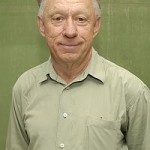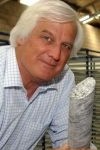Keynote Speaker
Sir Neil Cossons, OBE FSA FMA
Neil Cossons was Chairman of English Heritage from 2000 to 2007, where he headed the working group set up to review the management of England’s historic environment. The findings were published in Power of Place which, with the government’s response, Force for our Future, set the agenda for the modernisation of heritage protection and management. Neil Cossons was one of the pioneers of industrial archaeology in the 1960s and instigator in 1973 of the First International Congress on the Conservation of Industrial Monuments, which developed into TICCIH. He was the first Director of the Ironbridge Gorge Museum, from 1971, Director of the National Maritime Museum, Greenwich, and for fourteen years Director of the Science Museum, London – the National Museum of Science & Industry. He has published and broadcast widely on industrial archaeology, conservation and heritage management and was general editor of the 8-volume series, England’s Landscape, published in 2006.
Click here to read a synopsis of Sir Neil’s keynote address.
 |
Sir Neil has broadcast and published widely in his specialist field of industrial archaeology and also on landscape and conservation. Sir Neil Cossons is a Life President of TICCIH and in 1973 was an instigator of the First International Congress on the Conservation of Industrial Monuments. |
Plenary Speakers
Ms Deborah Boden, Post Grad Dip Mus Studies
Deborah Boden started her career in cultural services management in 1986 with Leicestershire County Council, moving to Essex County Council as the County Museum Development Officer. In 2001, she took up the post of Deputy Head of Bristol City Museums and Art Gallery. In 2003, Deborah joined Cornwall County Council’s Historic Environment Service as Co-ordinator of the Cornwall and West Devon Mining Landscape World Heritage Site bid. She led the team that prepared the WHS nomination and drafted the accompanying Management Plan which she now implements and monitors. One of the key policy areas covered by this plan is marketing the World Heritage Site to new target markets that are consistent with regional and national tourism strategies.
 |
Deborah’s presentation will outline the need to develop a new tourism destination “offer”, based on the World Heritage Site and its principles and values. These are derived from UNESCO’s operational guidelines and the Cornish Mining Landscape’s Outstanding Universal Value and the many different stories and landscapes that this represents. The Cornish Mining WHS visitor’s experience must take in aspects such as landscape, townscape, interpretation and communication, and involve the various partners responsible for these aspects in the development of a new, holistic, destination. |
Gerald T. Takano, BA, B.Arch, A.I.A., M.ICOMOS
Mr. Gerald Takano is President and Principal of TBA West, Inc., a West Coast USA-based architectural firm affiliated with TBA Architects, Inc., located in greater Boston, Massachusetts. The primary focus of the firm is historic preservation. In addition to over 12 years experience as an architectural planner and designer, Mr. Takano has worked with communities to build an understanding and appreciation of diversity and the built environment. He is familiar with issues pertinent to governmental entities, numerous non-profit organizations and the private sector on projects involving architectural planning, design and history. He was born in Hawaii and now resides in San Francisco.
 |
In his paper as a Plenary Speaker, ‘Beyond Sentiment: Financing the Rehabilitation and Restoration of Historic Company Towns’, Mr. Takano will address the management of historic industrial towns in the Pacific, including: the fishing town and former national capital, Levuka, in Fiji; the lumber towns, Samoa and Scotia, in Northern California; and plantation towns such as the sugar mill town, Honoka’a, in the Hawaiian Islands. |
Simon R. Molesworth AM, QC, BA, LL.B, LFEIANZ, FAICD, FAIM, FVPELA, PIA (Hon.F.), C.Env.P., M.ICOMOS
Simon Molesworth is chairman of the Executive Committee of the International National Trusts Organisation. From 1980 to 2005, Simon was a councillor of the National Trust of Australia (Victoria), having been its honorary chairman and then president for almost 20 years. He was a board member of the Australian Council of National Trusts and was its chairman from 2001 to 2006. He was a Commissioner of the Australian Heritage Commission for 5 years from 1987. Practising as a barrister, he specialises in environmental, planning, heritage and natural resource law. His family are fifth generation pastoralists, with the Molesworth Pastoral Company and the firm Molesworth & Ware Pastoral owning stations from the early 1870s in Queensland, New South Wales and Victoria.
 |
In his paper as a Plenary Speaker, ‘The challenge of the ephemeral: endeavouring to put principle in to practice when faced with the ephemeral nature of Outback Heritage’, Simon Molesworth will draw on his family’s pastoral experience on Rupee and Clevedale Stations in the Far Western Division of NSW, notfar from Broken Hill. |
Professor Peter Spearritt, BA (Hons) Syd, PhD (ANU), M.ICOMOS
Peter Spearritt is a devotee of places. He is fascinated about how places market themselves and his paper will examine the marketing of Broken Hill over the last hundred years. His books include Sydney’s Century: a history (UNSWP; 2000), Holiday Business: Tourism in Australia since 1870 (MUP; 2000) and Electrifying Sydney (EnergyAustralia; 2004). With colleagues at the University of Queensland, he has recently completed the website queenslandplaces.com.au, a guide to the 1100 cities, towns, villages and suburbs that can be found in that state.
 |
With Dennis Jeans and Don Godden, Peter has inspected abandoned mines, abandoned steelworks, abandoned power stations and even inspected working operations, from Departments of Public Works to electricity trading floors. When not on fieldwork, Professor Spearritt operates out of a l970s manque sandstone structure abutting the Great Court at the University of Queensland. |
Panel Session
Panel Session Chair – Professor Sharon Sullivan AO
 |
Sharon is the retired Executive Director of the Australian Heritage Commission and the former Australian Government representative on the World Heritage Committee. She has worked and published extensively on cultural heritage management issues in Australia and overseas, including the USA, China, Africa and Cambodia. She is a member of the Australian Heritage Council, which is the Australian Government’s principal adviser on the listing and conservation of heritage places. |
Panel Members
Theo Hooy, Asst Sec, Historic Heritage, Department Water, Heritage and the Arts
 |
Theo is the Assistant Secretary, Historic Heritage in the Department of the Environment, Water, Heritage and the Arts. He has assisted the Australian Heritage Council in its assessment of Broken Hill for inclusion in the National Heritage List. He has worked in management planning for marine and terrestrial protected areas in Australia and overseas and has also been involved in preparing nominations for a number of Australian World Heritage properties. Theo has managed a range of Federal government programs including vegetation management, wetlands, water reform, protected areas management and nature conservation on private land. |
Peter Oldsen (City of Broken Hill)
 |
Mr. Peter Oldsen is the Group Manager of Sustainability for the City of Broken Hill. He has been employed by Broken Hill City Council in various senior local government roles including Director of Environmental Services and Manager of Building and Development over the last 26 years. During the last 10 years he has had the responsibility of managing the City’s successful heritage programs in conjunction with Heritage Advisor and Architect, Elizabeth Vines. These programs have been awarded the Energy Australia & National Trust, Year of the Built Environment, Australian Property Institute, and Tidy Towns awards for heritage. |
Professor Ian Plimer, BSc, PhD
 |
Ian Plimer is Professor of Mining Geology at The University of Adelaide and Emeritus Professor of Earth Sciences at The University of Melbourne, where he was Professor and Head (1991-2005). He was formerly Professor at Newcastle and Munich. Much of his published 130 scientific papers has been on the Broken Hill ore deposit, he has a Broken Hill mineral named after him, is Patron of Lifeline Broken Hill and the Broken Hill GeoCentre and has Broken Hill coursing through his veins. |
| He has written seven books for the general public, and his latest, Heaven and earth: Global warming The Missing Science, is an international best seller. On his gunna do list is to write another book on Broken Hill. He is Director of CBH Resources Ltd, a company that is mining at Cobar, has a ship loader at Newcastle and has approval for constructing the new Rasp Mine in Broken Hill. |
Prof Richard Mackay, AM BA (Hons), MBA, IMC, MAACI, M.ICOMOS
Speaking for Perilya
 |
Richard Mackay is a Partner of Godden Mackay Logan a leading Australian firm of heritage consultants and Adjunct Professor at La Trobe University. A former Director of the National Trust, and former member of the Heritage Council of NSW Richard was a member of the Australia ICOMOS Burra Charter Working Party and is currently a member of the Australian World Heritage Advisory Committee and the Australian State of the Environment 2011 Committee. In 2008-09 Richard was a Research Scholar at the Getty Conservation Institute and he recently joined the ICOMOS International Cultural Tourism Committee.
|
| Richard’s experience over the last two decades experience includes participation in more than 500 heritage management and archaeology projects, including work on heritage assessment, conservation planning and strategic advice for the Perilya Ltd Mines at Broken Hill, which encompass one of the world’s largest silver, lead and zinc ore bodies. In 2003 Richard was made a member of the Order of Australia, inter alia, for services to archaeology and cultural heritage. |









